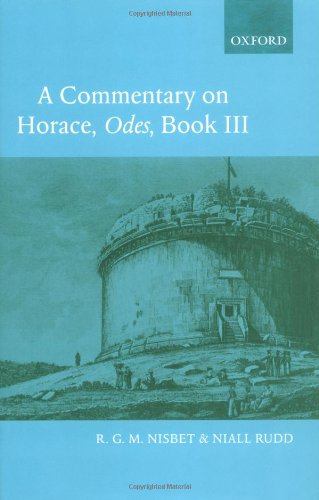

Most ebook files are in PDF format, so you can easily read them using various software such as Foxit Reader or directly on the Google Chrome browser.
Some ebook files are released by publishers in other formats such as .awz, .mobi, .epub, .fb2, etc. You may need to install specific software to read these formats on mobile/PC, such as Calibre.
Please read the tutorial at this link: https://ebookbell.com/faq
We offer FREE conversion to the popular formats you request; however, this may take some time. Therefore, right after payment, please email us, and we will try to provide the service as quickly as possible.
For some exceptional file formats or broken links (if any), please refrain from opening any disputes. Instead, email us first, and we will try to assist within a maximum of 6 hours.
EbookBell Team

4.8
104 reviews
ISBN 10: 0199263140
ISBN 13: 9780199263141
Author: R G M Nisbet, Niall Rudd
This book is a successor to the commentaries by Nisbet and Hubbard on Odes I and II, but it takes critical note of the abundant recent writing on Horace. It starts from the precise interpretation of the Latin; attention is paid to the nuances implied by the word-order; parallel passages are quoted, not to depreciate the poet's originality but to elucidate his meaning and to show how he adapted his predecessors; sometimes major English poets are cited to exemplify his influence on the tradition. In expounding the so-called Roman Odes the editors reject not only uncritical acceptance of Augustan ideology but also more recent attempts to find subversion in a court-poet. They show how Greek moralizing, particularly by the Epicureans, is applied to contemporary social situations. Poems on country festivals are treated sympathetically in the belief that the tolerant and inclusive religion of the Romans can easily be misunderstood. The poet's wit is emphasized in his addresses both to eminent Romans and to women with Greek names; the latter poems are taken as reflecting his general experience rather than particular occasions. Though Horace's ironic self-presentation must not be understood too literally, the editors reject the modern tendency to treat the author as unknowable. Although the text of the Odes is not printed separately, the headings to the notes provide a continuous text. The editors put forward a number of conjectures, most of them necessarily tentative, and in the few cases where they disagree, both opinions are summarized.
1. HORACE'S EARLY LIFE
2. THE DATE OF Odes I–III
3. THE 'ROMAN ODES'
4. HORACE AND AUGUSTUS
5. MAECENAS AND OTHER ADDRESSES
6. HORACE'S 'LOVE–POEMS'
7. RELIGION IN HORACE
8. THE MEANING OF THE AUTHOR
9. AMBIGUITY
10. PERSON AND PERSONA
11. GENRE
12. STYLE
13. STRUCTURE
14. THE ARRANGEMENT OF THE BOOK
15. THE TEXT
16. THE ANCIENT COMMENTATORS
17. METRE
horace odes 3.30
a commentary on horace odes book iii
horace odes 3 translation
horace ode 3
horace ode 3.30
horace commentary
horace odes 3
Tags: R G M Nisbet, Niall Rudd, Commentary, Horace